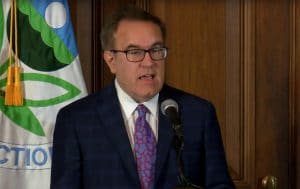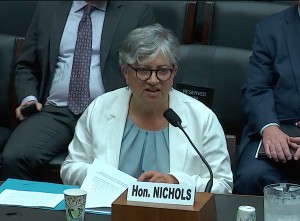
EPA Admin Andrew Wheeler, a former coal-industry lobbyist, is threatening to withhold billions in federal highway funds from California.
Less than a week after federal regulators announced they were eliminating the waiver allowing California to set its own greenhouse gas emissions, the head of U.S. Environmental Protection Agency on Monday threatened to pull federal highway funds because of the state’s air quality problems.
In a letter sent to the head of the California Air Resource Board, or CARB, on Tuesday, EPA Administrator Andrew Wheeler declared that California “has failed to carry out its most basic tasks under the Clean Air Act,” and thus suffers from “the worst air quality in the United States.” As a result, it could lose as much as $4 billion in highway funding during the coming fiscal year.
The letter escalated tensions between Washington and Sacramento and, in light of the move last week to block California from enforcing vehicle fuel economy and emissions rules that were set to be tougher than those at the federal level, it set off Trump Administration critics, notably including Senator Diane Feinstein, a California Democrat, who accused the White House of engaging in “the height of hypocrisy.”
(Threat of auto tariffs could scuttle planned US-Japan trade deal. Click Here for more.)
The Trump Administration has long signaled its plan to roll back the federal Corporate Average Fuel Economy, or CAFE, standards set during the Obama Administration. It is expected to announce the final plan in a few weeks. But it took the first step by eliminating the Golden State’s ability to regulate greenhouse gas emissions, something also approved under Pres. Barack Obama, expanding on the unique waiver established by Congress in the original Clean Air Act a half-century ago.
“No state has the authority to opt out of the nation’s rules, and no state has the right to impose its policies on the rest of the country,” U.S. Department of Transportation Sec. Elaine Chao said last Thursday during a joint news conference with EPA chief Wheeler. (The EPA and DoT jointly regulate CAFE.)
In fact, 13 other states, as well as the District of Columbia, have opted to follow the California emissions and mileage rules, rather than the current federal standards. Together, the group represents about a third of all U.S. car buyers. The 39.4 million residents of California alone make up about 20% of the American motor vehicle market.
According to the letter EPA Administrator Wheeler sent to CARB chief Mary Nichols, 34 million of those California citizens live in areas of the state that haven’t met Clean Air Act targets, or “more than twice as many people as (live in) any other state.”
The price of missing that target could thus run as much as $4 billion, the amount of federal highway duns that California was set to receive during the fiscal year that begins on October 1.
In his letter, Wheeler declared that the “EPA stands ready to work with California to meet the Trump Administration’s goal of clean, healthy air for all Americans, and we hope the state will work with us in good faith.”
That echoes comments he and DoT chief Chao made last week, claiming they tried to find a compromise with CARB over the greenhouse gas waiver but found the state unwilling to budge. California officials denied that and noted that they were able to strike a deal in July with four major automakers – BMW, Ford, Honda and Volkswagen – for a compromise on the emissions and mileage regulations. The Trump Administration denounced that agreement as a “PR stunt” and, earlier this month, the U.S. Justice Dept. began an antitrust inquiry into the deal.
(Trump Admin Eliminates CA Waiver, Delays Details on Fuel Economy Roll Back)
Last week, CARB Chairwoman Nichols said that the Trump Administration is only making things worse, especially with its latest moves on California’s waiver and any upcoming rollback of CAFE.
“We actually need these extra clean cars in order to meet the health standards that are set by the federal government that we violate now on a very regular basis throughout Southern California and the San Joaquin Valley,” said Nichols.
Following news that the feds may withhold highway funds, Senator Feinstein responded more bluntly, calling any “threat to withhold California’s highway funding over clean air quality…the height of hypocrisy. California doesn’t need to be lectured by an administration beholden to polluters.”
The legal battles between Washington and Sacramento are only likely to accelerate with the latest move by EPA’s Wheeler. Last week, California’s attorney-general announced a lawsuit meant to retain the state’s greenhouse gas waiver. And it is expected to take similar action if the White House follows through by withholding highway funds.
Even before then, the state filed its 29th lawsuit challenging environmental policies of the Trump Administration, this one linked to a federal decision covering salt ponds near Redwood City.


